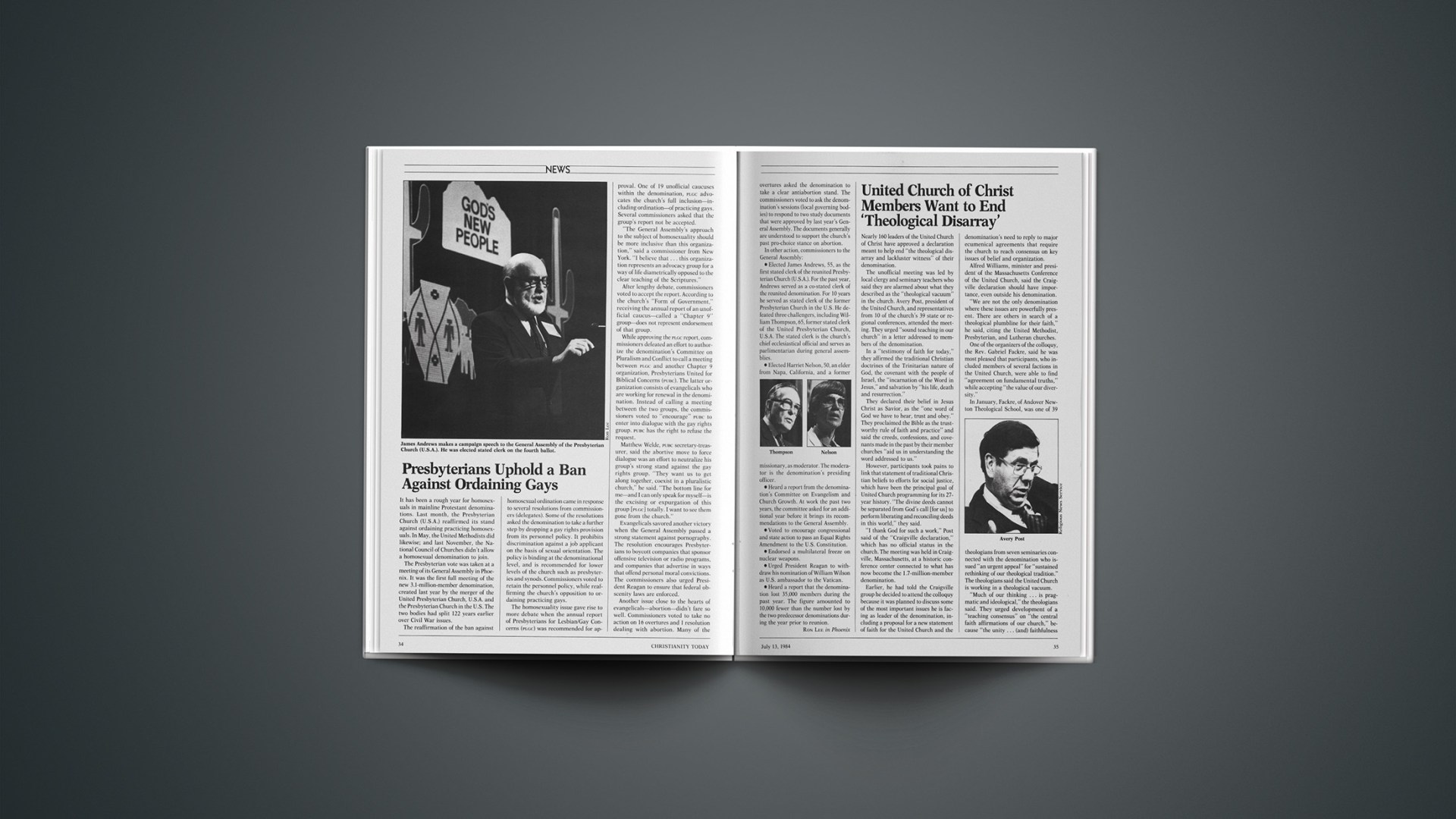It has been a rough year for homosexuals in mainline Protestant denominations. Last month, the Presbyterian Church (U.S.A.) reaffirmed its stand against ordaining practicing homosexuals. In May, the United Methodists did likewise; and last November, the National Council of Churches didn’t allow a homosexual denomination to join.
The Presbyterian vote was taken at a meeting of its General Assembly in Phoenix. It was the first full meeting of the new 3.1-million-member denomination, created last year by the merger of the United Presbyterian Church, U.S.A. and the Presbyterian Church in the U.S. The two bodies had split 122 years earlier over Civil War issues.
The reaffirmation of the ban against homosexual ordination came in response to several resolutions from commissioners (delegates). Some of the resolutions asked the denomination to take a further step by dropping a gay rights provision from its personnel policy. It prohibits discrimination against a job applicant on the basis of sexual orientation. The policy is binding at the denominational level, and is recommended for lower levels of the church such as presbyteries and synods. Commissioners voted to retain the personnel policy, while reaffirming the church’s opposition to ordaining practicing gays.
The homosexuality issue gave rise to more debate when the annual report of Presbyterians for Lesbian/Gay Concerns (PLGC) was recommended for approval. One of 19 unofficial caucuses within the denomination, PLGC advocates the church’s full inclusion—including ordination—of practicing gays. Several commissioners asked that the group’s report not be accepted.
“The General Assembly’s approach to the subject of homosexuality should be more inclusive than this organization,” said a commissioner from New York. “I believe that … this organization represents an advocacy group for a way of life diametrically opposed to the clear teaching of the Scriptures.”
After lengthy debate, commissioners voted to accept the report. According to the church’s “Form of Government,” receiving the annual report of an unofficial caucus—called a “Chapter 9” group—does not represent endorsement of that group.
While approving the PLGC report, commissioners defeated an effort to authorize the denomination’s Committee on Pluralism and Conflict to call a meeting between PLGC and another Chapter 9 organization, Presbyterians United for Biblical Concerns (PUBC). The latter organization consists of evangelicals who are working for renewal in the denomination. Instead of calling a meeting between the two groups, the commissioners voted to “encourage” PUBC to enter into dialogue with the gay rights group, PUBC has the right to refuse the request.
Matthew Welde, PUBC secretary-treasurer, said the abortive move to force dialogue was an effort to neutralize his group’s strong stand against the gay rights group. “They want us to get along together, coexist in a pluralistic church,” he said. “The bottom line for me—and I can only speak for myself—is the excising or expurgation of this group [PLGC] totally. I want to see them gone from the church.”
Evangelicals savored another victory when the General Assembly passed a strong statement against pornography. The resolution encourages Presbyterians to boycott companies that sponsor offensive television or radio programs, and companies that advertise in ways that offend personal moral convictions. The commissioners also urged President Reagan to ensure that federal obscenity laws are enforced.
Another issue close to the hearts of evangelicals—abortion—didn’t fare so well. Commissioners voted to take no action on 16 overtures and 1 resolution dealing with abortion. Many of the overtures asked the denomination to take a clear antiabortion stand. The commissioners voted to ask the denomination’s sessions (local governing bodies) to respond to two study documents that were approved by last year’s General Assembly. The documents generally are understood to support the church’s past pro-choice stance on abortion.
In other action, commissioners to the General Assembly:
• Elected James Andrews, 55, as the first stated clerk of the reunited Presbyterian Church (U.S.A.). For the past year, Andrews served as a co-stated clerk of the reunited denomination. For 10 years he served as stated clerk of the former Presbyterian Church in the U.S. He defeated three challengers, including William Thompson, 65, former stated clerk of the United Presbyterian Church, U.S.A. The stated clerk is the church’s chief ecclesiastical official and serves as parlimentarian during general assemblies.
• Elected Harriet Nelson, 50, an elder from Napa, California, and a former missionary, as moderator. The moderator is the denomination’s presiding officer.
• Heard a report from the denomination’s Committee on Evangelism and Church Growth. At work the past two years, the committee asked for an additional year before it brings its recommendations to the General Assembly.
• Voted to encourage congressional and state action to pass an Equal Rights Amendment to the U.S. Constitution.
• Endorsed a multilateral freeze on nuclear weapons.
• Urged President Reagan to withdraw his nomination of William Wilson as U.S. ambassador to the Vatican.
• Heard a report that the denomination lost 35,000 members during the past year. The figure amounted to 10,000 fewer than the number lost by the two predecessor denominations during the year prior to reunion.
RON LEEin Phoenix










